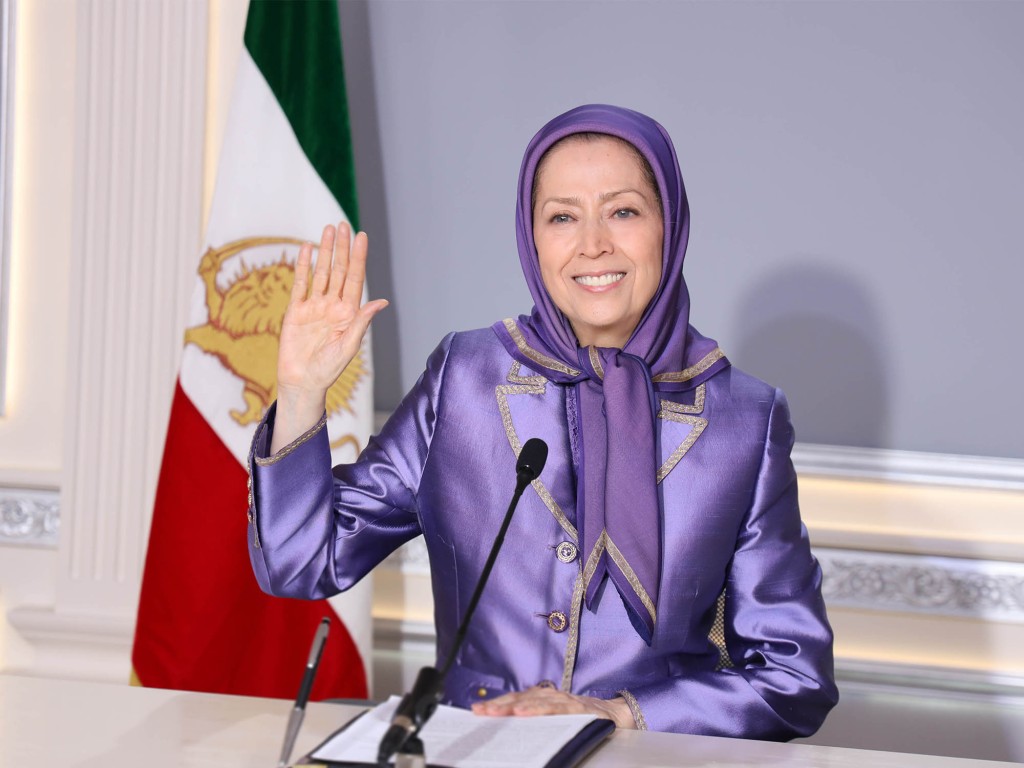Message to the conference announcing house majority support for the Iranian resistance

Maryam Rajavi: This regime is irreformable, and no one within the regime has the will or capability to reform it
Honorable Members of Congress,
I appreciate the bipartisan initiative of the House of Representatives in presenting Resolution 1148. This is a valuable model for an effective policy against the mullahs’ regime that has become the biggest cause of war and crisis in the region and the world. A religious dictatorship that is known for its massacre by executing 30,000 political prisoners in 1988.
I am very grateful to Congressman Randy Weber, who initiated this resolution. I extend my greetings to Congresswoman Elise Stefanik, Chair of the Republican Conference in this House, and the honorable Representatives Nancy Mace, Brad Sherman, Lance Gooden, Raul Ruiz, and Mario Diaz-Balart.
However, I cannot hide my deep sorrow over the loss of Congresswoman Sheila Jackson Lee. She was one of the pioneers in supporting the Iranian Resistance, my sister, dear old friend, and one of the first signatories of this resolution.
I extend my condolences to Congress, the American people, and her family on the passing of this great woman, a true advocate for justice and human rights.
She bravely stood against the regime, appeasement policies, and unjust labels against this resistance and she defended the PMOI members in Ashraf, in the most difficult times. Her name and memory will forever remain in the hearts of freedom loving people worldwide, especially among my compatriots in Iran.
Dear Friends,
Resolution 1148 and your conference today are of great importance given the current situation in Iran. On one hand, the people and the Resistance of Iran are engaged in a struggle to overthrow this regime. On the other hand, this regime is fueling war across the Middle East and beyond, including Europe, to overcome the crisis of its downfall. It is pursuing its nuclear bomb project at maximum speed and extending its arms of terror and crime to American soil.
The Mullahs’ Regime Is Irreformable
Since March, the people of Iran have boycotted five of the regime’s elections. This was a major development. The Iranian people reject all kinds of dictatorships, both Shah and the mullahs.
The evaluations made by the Iranian Resistance indicate that 88% of the population refused to participate in the so-called presidential election. The regime’s leader has acknowledged these boycotts that clearly demonstrate the widespread desire of the Iranian people to overthrow the regime.
Another decisive development is the expansion of Resistance Units in Iran. In May and June, leading up to the annual gathering of the Iranian Resistance, these units carried out 20,000 activities across 31 provinces.
Recently, those looking to justify appeasing this regime have turned their hopes to the regime’s new president. However, the people of Iran have declared for years that the game of reformists against hardliners is over.
The past 45 years have proven the Resistance’s position that this regime cannot make any reforms, and no one in this regime has the will or ability to bring about change.
The regime’s new president is nothing but a puppet. He has described himself as being “devoted to the Supreme Leader” and seeking only to carry out Khamenei’s plans.
He takes pride in his past as a member of Basij and the Revolutionary Guard. However, more important are his recent statements before and after the sham elections. He showed no desire to change Khamenei’s three main policies: domestic repression, foreign aggression, and nuclear projects.
In the past two weeks, he has quickly and openly assured proxy groups, including Hezbollah and the Houthis that the regime will continue to support them as before.
The regime has attempted to prevent unrest in Iran by provoking war in Gaza. It continuously sends weapons to its proxy groups through a corridor extending from Iran, to Iraq, Syria, and Lebanon. It frequently dispatches ships full of missiles and equipment to the Houthis.
Three Fundamental Steps Against the Clerical Regime
In such circumstances, three fundamental steps are essential for a correct policy to confront the Iranian regime. They include:
• Recognizing the struggle of the Iranian people to overthrow the regime and the right of Iranian youth to defend themselves against the Revolutionary Guards.
• Activating the snapback mechanism under Security Council Resolution 2231.
• Placing the regime under Chapter 7 of the United Nations Charter as a serious threat to global peace and security.
The NCRI wants to establish a democratic, free, non-nuclear republic based on the separation of religion and the state that is essential for peace and security in the region and tranquility throughout the world.
I am confident that with the determination of the Iranian people, we can and we must and we will free Iran.
Thank you all.
- Tags: Maryam Rajavi, mullahs' regime, NCRI, warmongering

